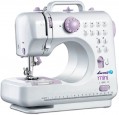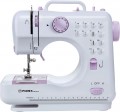Loop formation
The method of loop formation supported by the machine.
-
Automatic. Fully automatic loop formation; the user only needs to set the length, after which the machine will independently process the edges of the future loop, without the need to switch modes manually. The most convenient and advanced option; is the automatic method that is recommended if it is planned to overcast numerous loops.
-
Semi-automatic. When forming a loop in this way, work is done in 2 or 4 steps. For example, in the first case, the machine makes one short bartack and one long longitudinal line in one pass, then the mode switches and the second bartack and the second long line are performed; in the second case, respectively, you have to switch between 4 stages. Such work takes more time than the automatic formation of loops, but such machines are cheaper.
Number of loops
The number of loops that the sewing machine can sew. Different types of loops are used for different types of fabrics and clothing. The larger this number, the wider the choice of the user and the less likely it is that the loop of the desired type will not be in the arsenal of the machine.
Features
—
Alphabet letter embroidery. The ability to embroider letters of the alphabet using a machine. This function is found in computerized models. It is carried out due to a set of letters entered into the memory of the machine. Many models with this feature have several built-in fonts, and some even allow you to upload your fonts from your computer.
—
Differential bottom feed. The fabric feed consists of two gear racks — in front of and behind the needle. Depending on the set mode, such a feed can additionally stretch or, conversely, collect fabric during sewing; the first is useful when working with dense fabrics, the second — for knitwear, stretch and other easily stretching materials.
—
Reverse stitching. A function that allows you to switch the direction of movement of the fabric under the needle and, accordingly, the direction of the seam. Mainly used for stitching. The reverse is practically obligatory for sewing machines in the classical sense of the word — electromechanical, computerized and sewing-embroidery (see "Type"), but practically does not occur in other types.
— Free arm. A device for working with sleeves, trousers and other similar parts of clothing. This function is most often implemented due to the removable part of the desktop — when it is removed, the table turns into a narrow platform. The specific width of such a device ma
...y be different, it should be specified separately.
— Needle threader. A special device designed to facilitate the process of threading a needle. The presence of a needle threader is especially useful when changing threads frequently (for example, sewing alternately with different colours).
— Thread cutter. A mechanism for cutting the threads after sewing, eliminating the need to use scissors: to cut the thread, just press the button. Note that we are talking about an automatic thread cutter; hand tools mounted on the bodies of some machines are not considered thread cutters in this case.
— Pedal free sewing. The ability to use the machine without connecting the pedal. To start and stop the process in such models, usually, a special button is provided. Such an opportunity can be useful for long sewing when it would be tiring to keep the pedal constantly depressed, and for occasional use, when the machine starts “for a couple of stitches” and there is no need to fiddle with connecting the pedal.
— Twin needle sewing. The possibility of using a machine for sewing with a twin needle — a pair of needles fixed in one holder. There are different types of such needles and different methods of working with them, and some work is done only with a double needle. Anyway, the use of such devices requires that the machine be initially compatible with them.
— Needle stop switch (top/bottom). A switch that allows the user to select whether the needle will be in the up or down position after the motor stops. In the absence of such a switch, the needle, usually, stops only in the upper position, and this is not always convenient
